Psoriasis is a pink rash with silver scales. It is itchy and occurs in thousands of people all over the world. If a person or their relatives do not have such rashes, it does not mean that they will not appear. It is important to start the treatment of the disease in the early stages of psoriasis and not to have a severe attack.
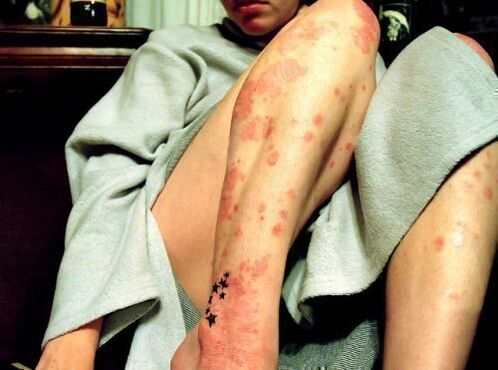
Psoriasis can be inherited, but not in all cases.
Disease characteristics
Psoriasis is not an infection, and the cause of its appearance is believed to be a violation of immune system function. Diseases can also be the result of external factors, skin damage, stress, alcohol, antibiotics, and infections.
Sores can cover any part of the body. The rash is especially common on the arms and legs. They also appear on the palms, feet, scalp and nails.
Psoriasis is a chronic disease with fluctuating processes. The person may experience periods of relief of the rash or make the condition worse. Recurrence can be triggered by a variety of external factors.
Psoriasis does not affect normal life and does not require frequent hospitalization. Nevertheless, this is a serious pathology that brings many inconveniences and limitations.
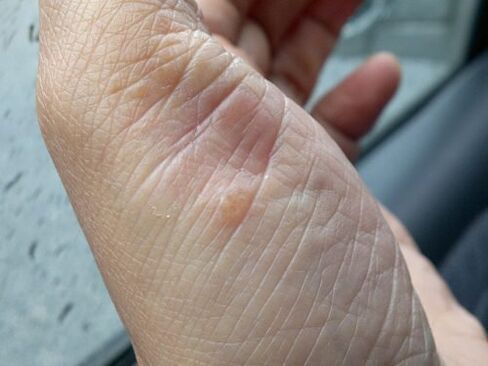
The manifestations of psoriasis can disappear and become almost invisible.
Conditional division of psoriasis
There are several forms of psoriasis:
- vulgar;
- Seborrheic
- Teardrop-shaped
- Palm-
- Psoriasis on the genitals.
The most common form of psoriasis is the vulgar form of this disease. With it, a bright-colored edematous rash appeared, accompanied by severe itching.
There are three levels of psoriasis, depending on the size of the affected area:
- light. Approximately 3% of the skin is affected.
- average. The number of rashes is 3% to 10% of the skin surface.
- Heavy. The rash accounts for 10% or more of the skin surface.
Sometimes the disease affects the joints. This is the most severe degree, no matter what percentage of the skin is affected by the plaque. It can lead to the development of psoriatic arthritis, accompanied by pain and swelling of the bones and joints.
According to the degree of deterioration, psoriasis is divided into three stages:
- progress;
- Fixed
- Returning.
Even a doctor may not always be able to recognize psoriasis at a specific stage. In many cases, special monitoring for the development of the disease is required. This will help determine whether psoriasis is relieving.
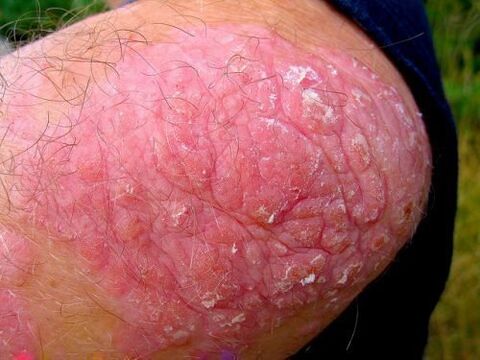
Psoriasis vulgaris has a bright pink color.
Progressive stage
In the early stages, psoriasis develops quite rapidly. Various rashes appear on the arms, back, buttocks, and legs, and these rashes can grow into plaques over time. The progression of the disease is characterized by severe itching of the affected area, which becomes moist and may cause infection.
Early psoriasis can be treated. Therefore, it is important to make a correct diagnosis in time. In the initial symptoms of psoriasis, you should consult a doctor. Only he can determine the nature of the skin disease and its stage of development.
You can independently understand the appearance of psoriasis by the following signs:
- A rash will appear where clothing is in close contact with the body. For example, on the arm in the elbow area, under the belt, there is an elastic band.
- The itchy rash is covered by gray scales.
- If the scale is removed, the skin underneath is thin and moist.
- The condition of the nails was disturbed, and dimples appeared on the dimples.
Do not use any ointment without consulting a doctor. The use of certain therapies in the early stages of the disease may lead to the formation of stretch marks, thinning of the epidermis and addiction.
Usually, your doctor will prescribe zinc-based non-hormonal drugs. This is an effective treatment that can relieve itching, reduce the proliferation and inflammation of skin cells, restore the protective function of the skin and reduce the development of psoriasis in the progressive stage.
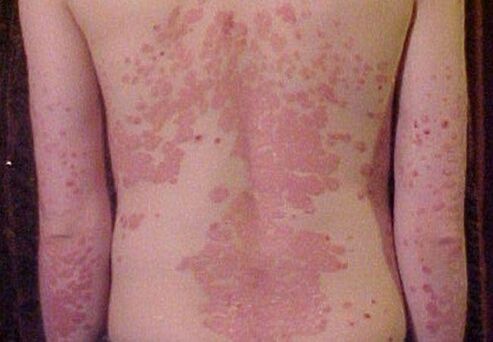
Psoriasis mainly occurs in the contact area between the skin and clothing.
Fixed stage
The previous phase is replaced by a stable phase of psoriasis. The inflamed nodules will not disappear, but they will not grow. The plaque dries out and the inflammation is reduced.
To treat the stable phase of psoriasis, tar-containing preparations are often used. Sometimes systemic therapy is used, and the human body is affected by ultraviolet rays.
Regression phase
This is the final stage of psoriasis, the plaques begin to shrink and gradually disappear. Absorption starts in the middle of the sore, and by the end of this stage, small rings and patterns remain on the skin. The itching and peeling disappeared. After the rash, there are almost no areas of pigmentation on the skin.
This process reaches the end of the psoriasis cycle, but the recovery is not yet complete. The disease can recur at any time. If left untreated, plaques will appear regularly.
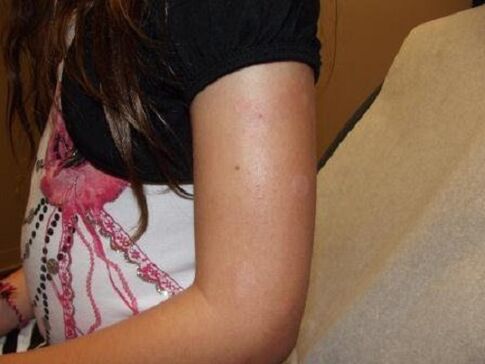
After psoriasis, spots and patterns may remain on the skin.
Treatment and prevention of psoriasis
Everyone should monitor their health and pay more attention to the skin:
- Avoid using hard towels that can scratch the skin.
- It is best to use a special medicinal shampoo. This is especially true for scalp psoriasis.
- It is necessary to pay attention to the optimal humidification of indoor air to avoid excessive drying of the skin.
- Avoid abrasions, injuries and cuts to the skin.
- Certain dietary habits should be followed to improve the course of the disease.
- One of the main rules of prevention is to abstain from alcohol. You should not drink alcohol and quit smoking.
- Wear loose clothes that will not cause abrasions.
In order to prevent and treat psoriasis, a special massage method is used. It improves blood circulation, thereby cleaning the skin faster. The body area around the plaque was stretched a few centimeters and then returned. The process takes about 15 minutes.
The symptoms of the disease occur in the context of psychological and emotional stress. Therefore, it is important to minimize the pressure. They recommend using herbs and tranquilizers to practice various relaxation methods, adequate sleep and more rest.
Some patients use folk remedies at home. For this, use various herbal extracts and decoctions, ointments in eggs and lard, garlic dressings and lotions before going to bed. After consulting an expert, other methods should be used.
Some medicines can cause recurrence and side effects. They should only be taken as directed by your healthcare professional. Unfortunately, no medicine can eliminate psoriasis 100% forever. You can only keep the disease in remission by choosing the right medicine.























